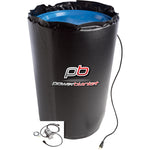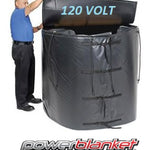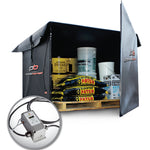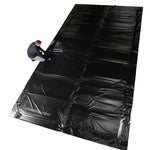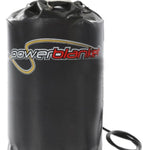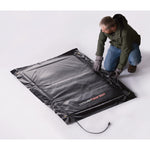You have no items in your shopping cart.
What is the Freezing Point of Motor Oil and What Can You Do About It?
Article At-a-Glance
Can Motor Oil Freeze, and If So, at What Temperature?
Motor oil doesn't freeze in the traditional sense but can thicken and become unusable between -4°F to -58°F, impacting engine performance in cold weather.
Key Takeaways
- Understand Motor Oil Behavior in Cold: Motor oil doesn't freeze like water but thickens significantly between -4°F to -58°F, affecting engine performance.
- Impact of Cold on Viscosity: As temperatures drop, motor oil becomes more viscous, potentially leading to engine issues like increased wear and reduced efficiency.
- Preventive Measures: Store vehicles in warm environments and consider using winter-grade motor oil to maintain optimal engine function in cold weather.
- Thawing Frozen Oil: If motor oil thickens, gradually warming it can restore its fluidity, ensuring it flows properly through the engine.
- Storage Solutions: Use explosion-proof heaters for safe storage of motor oil in cold conditions, preventing thickening and and ensuring safety in hazardous environments.
The freezing point of motor oil is between -4 F to -58 F, depending on the oil. If it freezes, the consequences can be serious. Read on to learn about how to prevent motor oil from freezing.
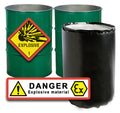
$2,550.00 USD
55 Gallon Explosion-Proof Drum Heater C1D2 (120V)
To keep your motor oil and other fluids safe from freezing, explore explosion-proof drum heaters. They are designed for hazardous locations, ensuring both safety and functionality.
What is the freezing point of motor oil?
Motor oil will “freeze” between -4 to -58 F(-20 to -50 C). Technically speaking, oil will freeze into a solid block of oil in unreasonable temperatures (-320 F). When we say “freezing,” we mean that the oil can thicken and form clumps, leading to engine seizure. While this thickening isn’t exactly freezing, it’s widely considered to be thick enough to be unusable. Thus, the terms “freezing” and “thickening” are often interchangeable.
Most mechanics will tell you that motor oil can’t freeze. They’re right, but that doesn’t mean you can just run your vehicle on cold, thickened oil. It is important to keep your vehicle parked in a warm space during cold weather to prevent it from thickening. You can also switch to winter-grade motor oil, which freezes at a much lower temperature than conventional oil. Additionally, make sure to check your oil levels regularly and keep them at the appropriate level. Taking these precautions can help prevent frozen motor oil and protect your engine.
How to prevent your motor oil from freezing
Heat is the critical component in keeping your oil from getting too cold. There are two simple ways to prevent motor oil from freezing:
- Keep your vehicle in a warm garage or parking area when not in use.
- Use an engine block heater to keep the air temperature around your engine well above freezing.
By ensuring a consistent flow of heat to the engine, the oil will stay warm and usable. Motor oil is warmed naturally by a running engine, so freeze prevention while the vehicle is operating isn’t really an issue. Frozen motor oil is generally only an issue when vehicles aren’t in use and when the oil is stored separately.
What to do if your motor oil does freeze?
Frozen motor oil is too thick to use. It might not even leave the bottle or barrel at certain temperatures. When this happens, the best thing to do is slowly thaw it back to a more fluid viscosity.
How to thaw frozen motor oil
Motor oil can freeze in drums, just like it can freeze in engines. To prevent this from happening, you can take a few precautions. First, make sure your drums are stored in a warm space. Second, use a drum heater to keep the oil warm. Third, make sure the drums are sealed properly so that the heat can’t escape. Taking these precautions can help prevent frozen motor oil in drums and protect your equipment.
Will using frozen motor oil hurt my engine?
Using frozen motor oil reduces the ability of the oil to move around engine components. Most often, the oil will get clogged in the oil lines and damage the fuel pump. These issues alone are plenty of reasons not to use frozen motor oil. However, let’s learn other problems that can arise from using oil that is too thick and how to prevent oil from freezing.
The consequences of using frozen motor oil
Using frozen motor oil can have several negative consequences, including:
- Reduced engine performance, increased engine wear: Frozen motor oil is thicker and less fluid than oil at normal operating temperatures, which can lead to reduced engine performance. The engine may not start easily, and it may not run smoothly. Additionally, frozen motor oil may not flow throughout the vehicle properly, which means it can’t reach all parts of the engine. This can result in increased friction and wear on engine components, potentially leading to engine failure.
- Engine component damage: If you start your vehicle with frozen oil, it can lead to serious engine damage. For example, it may cause the oil filter to burst, resulting in oil leaking out of the engine and causing damage to other parts of the vehicle. The oil pump on your vehicle can also become damaged by pumping thick oil through the engine. This can lead to reduced oil pressure which can cause even more damage.
- Increased fuel consumption: When your engine has to work harder due to poor lubrication, it will consume more fuel, which will decrease the fuel efficiency of the vehicle.
Overall, it’s essential to use motor oil that is at the correct temperature for optimal engine performance and protection.

How to properly store motor oil in cold weather
Oil kept in storage, be it in the bottle it came in or stored in a 42-gallon barrel, is susceptible to freezing. If temperatures drop too low, it can become thick and unusable. In these situations, it’s best to find ways of heating your oil to prevent it from getting too cold.
Properly heating oil in storage should take several factors into account, including:
- Temperature control: Not all cold environments are due to winter weather. Several industries rely on vehicles in refrigerated warehouses, with vehicles like forklifts operating in low temperatures. Being able to regulate the temperature of your stored oil allows you the flexibility of heating it in cold working areas as needed.
- Bulk vs bottled storage: How you should efficiently store oil depends on how much you have. Bulk storage will require different heating equipment than a few bottles.
- Storage safety: Oil is a flammable material that can ignite if exposed to open flame. This can lead to an explosion, causing potentially catastrophic damage to equipment, product, buildings, and employees. Storing oil and heating it should only use the best explosion-proof materials.
What is flameproof or explosion-proof equipment?
Explosion-proof equipment is a type of enclosure that prevents a potential explosion from moving past the walls of the enclosure. Heat Authority provides explosion-proof heaters that heat things like motor oil without the worry of the oil combusting. The vinyl shell of the heater helps keep any potential explosive force inside, preventing injury to workers or damages to product and processes.

How do explosion-proof heaters transfer heat?
Explosion-proof heaters don’t operate like traditional forced air heaters. Forced air heaters transfer heat from a circulating liquid across metal fins by convection. Like a car’s radiator, heat in the metal transfers to the air by convection as the air circulates.
On the other hand, pipes, tanks, and other equipment require direct heat transfer. For example, hazardous location heaters for drums and totes wrap around the surface. (Explosion-proof heater is another way of saying hazardous location heater.)
How does explosion-proof equipment work?
Internal heating elements transfer heat directly from the explosion-proof electric heater to the surface of the drum into the interior. There is no opportunity for the motor to cause a spark because there are no moving parts. The electrical heating elements have no possibility of contacting explosive gas or dust particles because of the rugged, weatherproof material surrounding them.
Why do we need explosion-proof equipment?
There are many industrial heaters for different environments, but only certain ones should be used in hazardous areas. Heating in hazardous areas can be anything from a huge chemical plant to a mechanic’s garage. Explosion-proof heating equipment is essential for anyone using or storing combustible materials like motor oil, fuel, and other ignitable chemicals. Explosion-proof heaters like drum heaters allow business to carry on as usual without the worry of fire or other accident. By using explosion-proof heaters in hazardous locations, costly (or even deadly) workplace incidents can be reduced or eliminated by using equipment that gets the job done while increasing workplace safety. Additionally, explosion-proof electrical heaters are less expensive to run than electric radiators or forced fan-type heaters, saving you money.
Does Class 1, Division 2 require explosion-proof equipment?

Heat Authority is proud to offer explosion-proof electrical heating products from Powerblanket. Powerblanket offers complete custom hazardous location solutions for direct heating, with hazardous location heaters approved for use in Class I, Division 2: Groups A, B, C, and D hazardous environments. They have a maximum Temperature Classification of T4 and are designed for dangerous environments, including hazardous workplaces where explosion-proof equipment is required.







